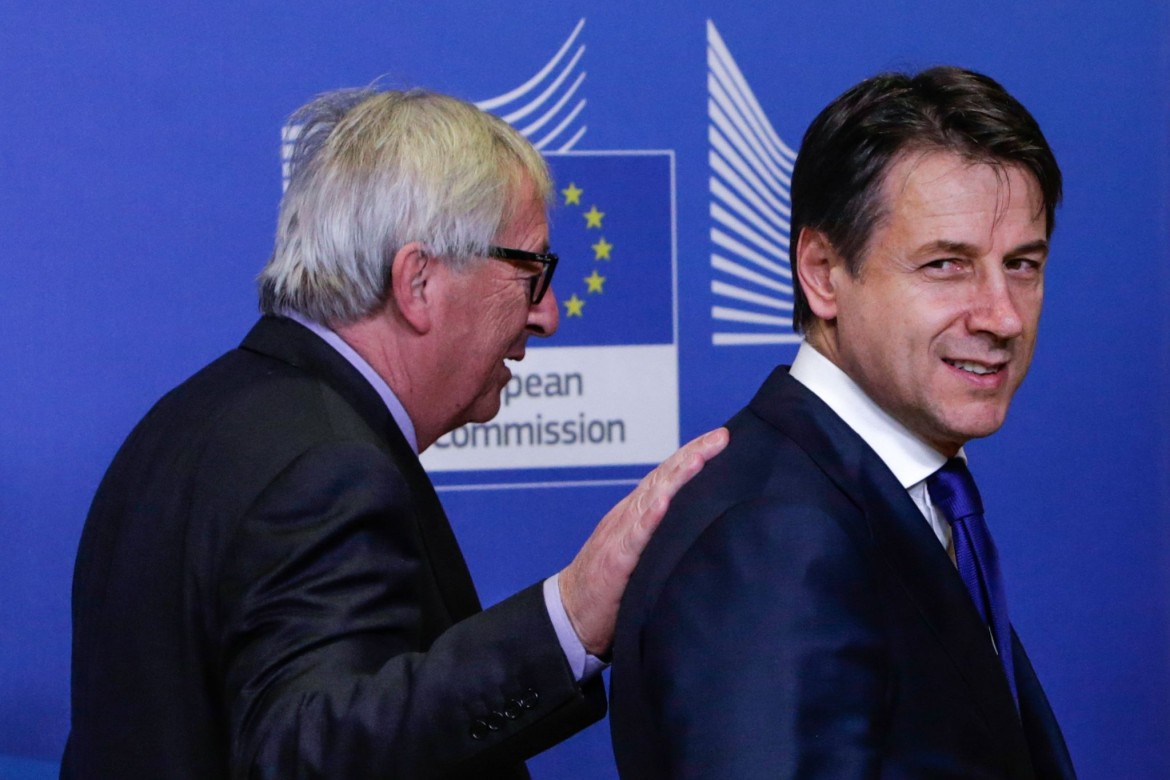Analysis
Italian government surrenders to EU, lowering spending
For Prime Minister Giuseppe Conte, ‘We will respect our commitments on the basic income and pension reform. We’re not giving up anything.’ It’s not likely the economic growth they’re projecting will materialize, but further cuts would indeed be intolerable.

The Italian government has replaced its budget projecting a 2.4 percent deficit to one with 2.04 percent, hoping not too many people would notice the difference. The capitulation, which was perhaps inevitable, was accompanied by a flurry of ingenious spin, the kind that politics has been full of since its very beginning.
It was necessary to prevent the electorate from understanding just how much of a total defeat it was, and Mr. Conte, a lawyer by trade, fresh after his encounter with the Holy Trinity of the European Commission—Mr. Juncker, VP Dombrovskis and Commissioner for Economic and Financial Affairs Moscovici—is certainly laying it on thick: “We will respect our commitments on the basic income and pension reform. We’re not giving up anything.”
So, nothing will change at all? If anything changes, of course, it will only be for the better: “The structural deficit will fall, and the growth will be higher than expected.” Higher than 1.5 percent, despite the looming recession? That’s exactly what he’s saying. According to Conte, what will make such a miracle possible is the fact that the government has been “particularly cautious” with public finances.
Thus, he says, they were in for a pleasant surprise: “the technical estimates have allowed us to recover resources, and we have added something to the spending plan.” In short, what is €7.5 billion less for the deficit, if we assume that it will shed €15 billion anyway with the revision of the deficit estimates for 2020 and 2021? If, of course, such predictions materialize—and, most likely, they will not.
The Italian government’s capitulation was decided between two meetings with the president: one before the dinner with Juncker, when the government agreed to take the first step back, and the lunch Wednesday with all the top government staff, where Mattarella recommended that the dispute with the Commission be resolved in a positive way, otherwise the risk to the economy would be very high. It remains to be seen whether Europe will be satisfied. It’s not a given, but Conte certainly hopes so. He confesses that he is “ambitious”—indeed, he was able to bring home the prize, namely the stop to the infringement proceedings, although only because he straight-up conceded to almost everything they asked. Like a true warrior.
In any case, “the lawyer of the Italians” went to Brussels in what turned out to be a “fruitful climate,” and the sources in Brussels confirm it: there was significant progress, but there is still some “technical” work to be done. The Commission wants the capitulation to be a real one, not a fiscal shell game: in addition to shrinking the deficit figure, they will also want something set out in black and white regarding those pesky reforms. This is the situation that Conte discussed yesterday in his nighttime meeting with the two vice-prime ministers, and this is what Tria has promised to “negotiate with a vengeance” in Brussels starting today. But at this point, it is almost impossible to imagine any last-minute shock development.
In truth, if the EU were to insist on a further lowering of the deficit, down to the 1.8 percent they had previously requested, the Italian government could not simply take that lying down, and they should, reluctantly as that may be, make a stand. But they won’t have much to fear from the Commission on that front. The obstacle could be the European Council, which contains the representatives of the most fiscally strict governments. However, punishing Italy while willfully closing their eyes and doing nothing about France, which is currently on a clear trajectory to surpass 3 percent, might be too much even for fiscal hawks such as the Dutch and the Austrians.
The French case is a tricky one. It’s all too clear that what’s good for the goose isn’t good for the gander: yesterday, in fact, Moscovici explicitly excluded any measures against his native country. It is an embarrassing situation, yet one regarding which our Minister, Mr. Tria, only managed a truly inscrutable remark, brazenly denying reality: “There aren’t two different standards and measures in the behavior of the Commission.” And that’s all he was willing to say about that.
What forced the M5S to accept this capitulation, after they hesitated until the very last moment before agreeing to cross (back over) the Rubicon of 2.2 percent, was the massive pressure from the technocrats, but also that from the pragmatic wing of the Lega, led by Giorgetti, who was in a celebratory mood yesterday. But there was also the awareness of the huge risk of a government crisis that the infringement procedure would have entailed. If the procedure is avoided, these risks diminish—without disappearing, however. There isn’t that much power to go around, and the two parties forming the majority aren’t going to play nice when dividing it. The first test will be replacing Tria, a key player, in January. Among the rumors going around, the most credible ones are touting as his replacement someone who is an expert on public debt: Gustavo Piga.
Originally published at https://ilmanifesto.it/il-governo-si-arrende-alla-ue-il-deficit-scende-al-204/ on 2018-12-13
